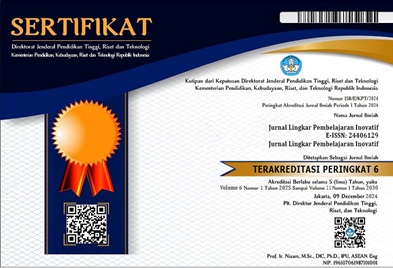PENGARUH MODEL PEMBELAJARAN INQUIRY LEARNING DISERTAI JELAJAH ALAM SEKITAR (JAS) TERHADAP HASIL BELAJAR KOGNITIF DAN PSIKOMOTOR PESERTA DIDIK SMAN 2 SUNGAI LIMAU PADA MATERI EKOSISTEM
Kata Kunci:
Hasil belajar, Inquiry Learning, Jelajah Alam Sekitar (JAS)Abstrak
Penelitian ini bertujuan untuk mengetahui perbedaan hasil belajar biologi pada materi ekosistem antara peserta didik yang menggunakan model Inquiry Learning disertai Jelajah Alam Sekitar (JAS) dan yang tanpa menggunakan model Inquiry Learning disertai Jelajah Alam Sekitar (JAS). Jenis penelitian yaitu eksperimen semu, dengan rancangan Posttest Only Control Group Design. Sampel penelitian yaitu kelas Fase E-3 dan Fase E-4 ditentukan dengan teknik purposive sampling. Metode pengumpulan data yaitu tes dan non tes. Data diuji normalitas, homogenitas, dan hipotesis menggunakan uji independent sampel t-test dengan bantuan Microsoft Office Excel. Berdasarkan hasil penelitian diketahui bahwa hasil belajar kognitif peserta didik kelas eksperimen lebih tinggi (83,08) dibandingkan kelas kontrol (76,47) dan hasil belajar psikomotor kelas eksperimen juga lebih tinggi (89,67) dibandingkan kelas kontrol (83,58). Hasil uji hipotesis dilihat dari nilai signifikansi < 0,05 yaitu 0,004 pada ranah kognitif dan 0,0002 pada ranah psikomotor. Berdasarkan hasil uji hipotesis dapat disimpulkan bahwa terdapat pengaruh positif yang signifikan model Inquiry Learning disertai Jelajah Alam Sekitar (JAS) pada materi ekosistem terhadap hasil belajar kognitif dan psikomotor peserta didik SMAN 2 Sungai Limau.
This study aims to determine the differences in biology learning outcomes on ecosystem material between students who use the Inquiry Learning model accompanied by Exploring Nature Around (JAS) and those without using the Inquiry Learning model accompanied by Exploring Nature Around (JAS). This type of research is a pseudo-experiment, with a Posttest Only Control Group Design. The research samples were Phase E-3 and Phase E-4 classes determined by purposive sampling technique. Data collection methods are tests and non-tests. Data were tested for normality, homogeneity, and hypothesis using independent sample t-test with the help of Microsoft Office Excel. Based on the results of the study, it is known that the cognitive learning outcomes of experimental class students are higher (83.08) than the control class (76.47) and the psychomotor learning outcomes of the experimental class are also higher (89.67) than the control class (83.58). The results of hypothesis testing are seen from the significance value <0.05, namely 0.004 in the cognitive domain and 0.0002 in the psychomotor domain. Based on the results of hypothesis testing, it can be concluded that there is a significant positive effect of the Inquiry Learning model accompanied by Exploring the Natural Environment (JAS) on ecosystem material on cognitive and psychomotor learning outcomes of students of SMAN 2 Sungai Limau.





